人教版九年级【英语】上册知识点归纳
九年级上册英语人教版笔记

九年级上册英语人教版笔记一、Unit 1 How can we become good learners?1. 重点单词。
- aloud:adv. 大声地;出声地。
例如:Read aloud so that we can all hear you.(大声朗读以便我们都能听到你。
)- pronunciation:n. 发音;读音。
Your pronunciation is very good.(你的发音很好。
)- patient:adj. 有耐心的;n. 病人。
Be patient with children.(对孩子们要有耐心。
)- expression:n. 表达(方式);表示。
Facial expressions can show our feelings.(面部表情能展示我们的感受。
)2. 重点短语。
- by doing sth.:通过做某事。
We can improve our English by reading English books.(我们可以通过读英语书提高英语。
)- make mistakes:犯错。
Everyone makes mistakes when they learn something new.(每个人在学习新东西的时候都会犯错。
)- look up:查阅;抬头看。
Look up the new word in the dictionary.(在词典里查阅这个新单词。
)3. 重点句型。
- How do you study for a test?(你如何为考试而学习?)- I study by working with a group.(我通过小组合作来学习。
)- The more you read, the faster you'll be.(你读得越多,你就会读得越快。
)二、Unit 2 I think that mooncakes are delicious!1. 重点单词。
人教版初三英语上册知识点汇总

九年级英语上册知识点汇总Unit1 The Changing World Topic1 Our country has developed rapidly.【短语和句型归纳】1.have a good summer holiday暑假过得愉快e back from从......回来3.have/has been to去过4.have/has gone to去了5.not...any more再也不...6.take photos照相7.by the way顺便问一下8.take part in参加9.around/all over/throughout the world全世界10.tell sb.something about...告诉某人关于某事11.have/live a happy/hard life过着幸福/艰苦的生活12.describe...in detail详细描述13.give support to支持...14.see...oneself亲眼看见15.keep in touch with与...保持联系16.far away遥远的17.kinds/sorts of各种各样的...18.not only...but also不仅...而且...19.make progress取得进步20.more than/over多于21.develop/improve rapidly迅速发展/改善22.tell sb.(not)to do sth.告诉某人(别)做某事23.ask sb.(not)to do sth.要求某人(别)做某事24.in order to do sth.为了做某事25.have to do sth.不得不做某事26.It s+形容词+for sb.to do sth.对于某人来说做某事是...的27.why not do sth.为什么不做某事28.succeed/be successful in doing sth.成功地做某事29.dream about doing sth.梦想做某事30.see/hear sb.do/doing sth.看见/听见某人做/正在做某事【语法点归纳】现在完成时一.现在完成时的基本结构肯定句:主语+have/has+动词的过去分词+其他否定句:主语+have/has+not+动词的过去分词+其他一般疑问句:Have/Has+主语+动词的过去分词+其他特殊疑问句:特殊疑问词+一般疑问句(have/has+主语+过去分词+其他)二.现在完成时的用法1.现在完成时用来表示过去已经完成的动作对现在造成影响或后果。
人教版九年级上册英语知识点汇总
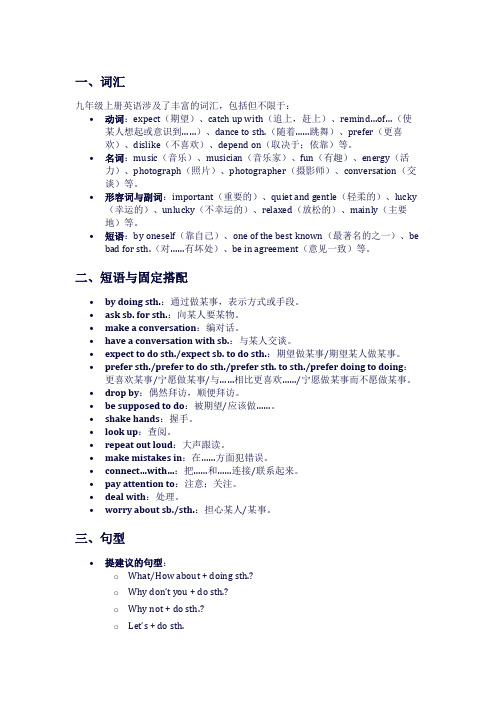
一、词汇九年级上册英语涉及了丰富的词汇,包括但不限于:•动词:expect(期望)、catch up with(追上,赶上)、remind…of…(使某人想起或意识到……)、dance to sth.(随着……跳舞)、prefer(更喜欢)、dislike(不喜欢)、depend on(取决于;依靠)等。
•名词:music(音乐)、musician(音乐家)、fun(有趣)、energy(活力)、photograph(照片)、photographer(摄影师)、conversation(交谈)等。
•形容词与副词:important(重要的)、quiet and gentle(轻柔的)、lucky (幸运的)、unlucky(不幸运的)、relaxed(放松的)、mainly(主要地)等。
•短语:by oneself(靠自己)、one of the best known(最著名的之一)、be bad for sth.(对……有坏处)、be in agreement(意见一致)等。
二、短语与固定搭配•by doing sth.:通过做某事,表示方式或手段。
•ask sb. for sth.:向某人要某物。
•make a conversation:编对话。
•have a conversation with sb.:与某人交谈。
•expect to do sth./expect sb. to do sth.:期望做某事/期望某人做某事。
•prefer sth./prefer to do sth./prefer sth. to sth./prefer doing to doing:更喜欢某事/宁愿做某事/与……相比更喜欢……/宁愿做某事而不愿做某事。
•drop by:偶然拜访,顺便拜访。
•be supposed to do:被期望/应该做……。
•shake hands:握手。
•look up:查阅。
•repeat out loud:大声跟读。
人教版九年级英语上册各单元知识点归纳总结
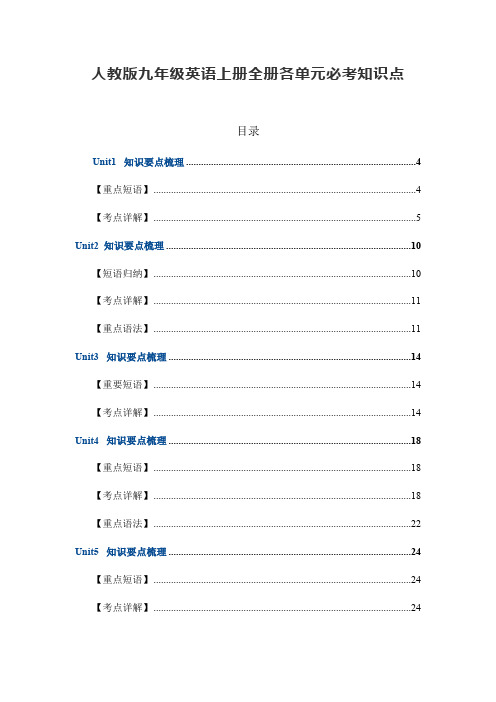
人教版九年级英语上册全册各单元必考知识点目录Unit1 知识要点梳理 (4)【重点短语】 (4)【考点详解】 (5)Unit2 知识要点梳理 (10)【短语归纳】 (10)【考点详解】 (11)【重点语法】 (11)Unit3 知识要点梳理 (14)【重要短语】 (14)【考点详解】 (14)Unit4 知识要点梳理 (18)【重点短语】 (18)【考点详解】 (18)【重点语法】 (22)Unit5 知识要点梳理 (24)【重点短语】 (24)【考点详解】 (24)【重点语法】 (27)Unit6 知识要点梳理 (30)【重点短语】 (30)【考点详解】 (30)【重点语法】 (33)Unit1 知识要点梳理【重点短语】1. have conversation with sb. 同某人谈话2. too…to… 太……而不能3. the secret to… ……的秘诀4. be afraid of doing sth./ be afraid to do sth. 害怕做某事5. look up 查阅6. repeat out loud 大声跟读7. make mistakes in 在……方面犯错误8. connect ……with… 把……和……连接/联系起来9. get bored 感到厌烦10. be stressed out 焦虑不安的11. pay attention to 注意;关注12. depend on 取决于;依靠13. the ability to do sth.. 做某事的能力【考点详解】1. by + doing 通过……方式(by是介词,后面要跟动名词,也就是动词的ing 形式)2. talk about 谈论,议论,讨论The students often talk about movie after class. 学生们常常在课后讨论电影。
talk to sb= talk with sb 与某人说话3. 提建议的句子:①What/ how about +doing sth.? 做…怎么样?(about后面要用动词的ing形式,这一点考试考的比较多)如:What/ How about going shopping?②Why don't you + do sth.? 你为什么不做…?如:Why don't you go shopping?③Why not + do sth. ? 为什么不做…?如:Why not go shopping?④Let's + do sth. 让我们做…...吧。
九年级上册英语重点短语归纳人教版

九年级上册英语重点短语归纳人教版Unit 1 How can we become good learners?1. ask sb. for help:向某人寻求帮助。
2. read aloud:大声朗读。
3. be afraid to do sth.:害怕做某事。
4. fall in love with:爱上。
5. look up:查阅(字典等)6. connect…with…:把……和……连接或联系起来。
7. pay attention to:注意;关注。
8. depend on:取决于;依靠。
9. in common:共同的;共有的。
Unit 2 I think that mooncakes are delicious!1. put on:增加(体重);发胖;穿上。
2. lay out:摆开;布置。
3. end up:最终成为;最后处于。
4. share sth. with sb.:与某人分享某物。
5. as a result:结果。
6. care about:关心;在意。
7. remind sb. of sth.:使某人想起某事。
Unit 3 Could you please tell me where the restrooms are?1. used to do sth.:过去常常做某事。
2. be used to doing sth.:习惯于做某事。
3. be used for (doing) sth.:被用于(做)某事。
4. on one's way to…:在某人去……的路上。
5. pass by:路过;经过。
6. pardon me:抱歉;对不起;请再说一遍。
7. from time to time:有时;偶尔。
Unit 4 I used to be afraid of the dark.1. deal with:应对;处理。
2. be proud of:为……骄傲;感到自豪。
人教版九年级英语上册知识点归纳

人教版九年级英语全册知识点归纳及习题〔最新〕Unit 1 How can we bee good learners?短语总结:1. good learners优秀的学习者2. work with friends 和朋友一起学习3.study for a test 备考4.have conversations with 与……交谈5.speaking skills 口语技巧6.a little 有点儿7.at first 起初起先8.the secret to......,.......的秘诀9.because of 因为10.as well 也11.look up (在词典中等)查阅;抬头看12.so that 以便,为了13.the meaning of ……的意思14.make mistakes 犯错误15.talk to 交谈16.depend on 依靠依赖17.in mon 共有的18.pay attention to 注意关注19.connect ……with ……把……联系。
20.for example 例如21.think about 考虑22.even if 即使尽管纵容23.look for 寻找24.worry about 担忧担忧25.make word cards 制作单词卡片26.ask the teacher for help 向教师求助27.read aloud 大声读28.spoken english 英语口语29.give a report 作报告30.word by word 一字一字地31.so……that 如此……以至于32.fall in love with 爱上33.something interesting 有趣的事情34.take notes 记笔记35.how often 多久一次36.a lot of 许多37.the ability to do sth. 做某事的能力38.learning habits 学习习惯39.be interested in 对……感兴趣40.get bored 感到无聊41.be good at 在……方面擅长42.be afraid of 害怕43.each other 彼此互相44.instead of 代替而不是二.用法集萃1.by doing sth 通过做某事2.it +be+adj+to do sth 做某事是……的3.finish doing sth 完成某事4.what about doing sth?做某事怎么样?5.try to do sth 尽力做某事6.the +比拟近,the+比拟近越……,就越……7.find it+adj+to do sth 发现做某事8.be afraid of doing sth 害怕做某事9.help sb (to) do sth 帮助某人做某事10.practice doing sth 练习做某事11.keep doing sth 一直做某事12.be afraid to do sth 害怕做某事13.begin to do sth 开场做某事14.want to do sth 想要做某事15.need to do sth 需要做某事16.remember to do sth 记得做某事17.shoot 射〔射着,射死等表结果〕18.shoot at〔瞄准〕射Unit1 检测题一.单项选择1.—_______ do you study English? —By listening to tapes.A. HowB. WhereC. WhenD. Why2.You can improve your English practicing more. A.by B.with C.ofD.in3. Why not practice your _________English in _________ English-speaking country?A. speaking, aB. speaking, anC. spoken, an4. ________conversations with others is one of the secrets to _________a successful learner.A. Practice, beeB. Practice, beingC. Practicing, being5 ---There’re a few new words in the article? ---What about _________in your dictionary?A. looking it upB. looking up itC. looking them up6. We’ll go out to play _________ it rains tomorrow. A. so B. unless C. because7. Can you ________which is the right answer to the question? A. look for B. find C. find out8. Jenny used to be afraid to ________in class, so she always ________nothing.A. speak, talkedB. speak, saidC. say, spoke9.— Why not listen to BBC news to improve your listening skills?—It’s ________ difficult _______ I can’t follow. A. too; to B. so; that C. such; that10. A good learner often thinks about ________he needs to practice more.A. thatB. whatC. how11.--I’m going to listen _______the tape. --OK. Remember to listen ________the key words.A. to, toB. to ,forC. for, to12. ________or not you can learn well depends on your learning habits.A. IfB. WeatherC. Whether13. I have finished _________my report. May I start to learn ________the guitar?A. writing, playingB. writing, to playC. to write, playing14. ---I often make mistakes _______grammar. ---Why not ask your teacher _______help?A. in, toB. in, forC. at, to15. _________write down the new words in your notebook?A. Would you likeB. How aboutC. Could you please16. ---Jack used to have ________writing practice. ---Yes, and he had learned _________.A. a lot of, a lot ofB. a lot of, a lotC. a lot, a lot of17. The more careful you are, ________mistakes you’ll make.A. fewer B. the fewer C. the less18. Good learners aren’t afraid _______mistakes. Instead, they learn ________mistakes.A. of making, inB. to make, fromC. to make, in19. For the first time, pay attention _________quickly to get the main ideas.A. to readB. readingC. to reading20.I discovered that listening tois the secret language learning.A.something intresting, toB.interesting something, toC.something interested, ofD.interested something of21.Jenny found it very easyEnglish well. A.learning B.to learn C.learnD.learned22. He_____ with the girl with golden hair and will soon get married____ her.A. falls in love; toB. is in love; toC. loves; withD. loves; to23. My father thinks _____ is a great way to learn English.A. study grammar.B. I study grammar.C. studying grammar.D. studies grammar24 Why not ___ your teacher for help when you can’t finish _____ it by yourself?A. ask; writeB. to ask; writingC. ask; writingD. asking; write25. I wonder if I can learn English well.— . All things are difficult before they are easy.A. I am afraid soB. You’re slowC. It takes timeD. It’s a piece of cake26 You’ll find _____________ easy to learn it well. A. that B. its C. it D. this27. –I don’t have a partner to practice English ______________.---Why not join an English language club to practice _______________?A. /; speakingB. with; to speakC. /; to speakD. with; speaking28. ---She hardly makes mistakes _________English grammar.---No, it seems that she was born ________the ability to learn languages.A. in, withB. with, inC. in, inD. with, with二用所给单词的适当形式填空。
九年级英语上册重点短语及考点归纳(人教版)
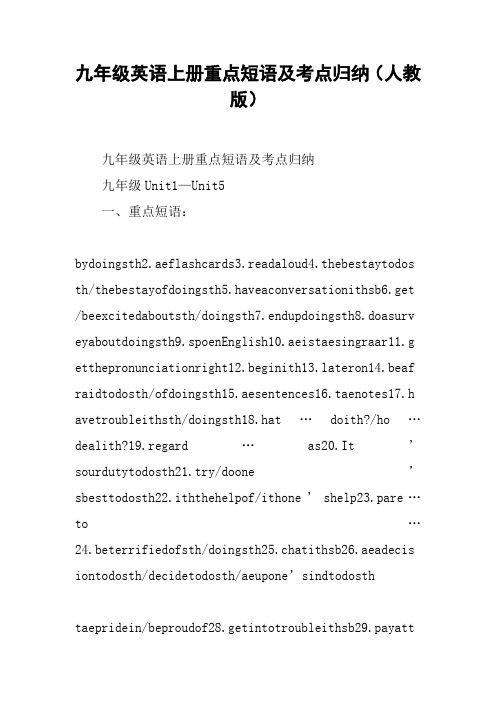
九年级英语上册重点短语及考点归纳(人教版)九年级英语上册重点短语及考点归纳九年级Unit1—Unit5一、重点短语:bydoingsth2.aeflashcards3.readaloud4.thebestaytodos th/thebestayofdoingsth5.haveaconversationithsb6.get /beexcitedaboutsth/doingsth7.endupdoingsth8.doasurv eyaboutdoingsth9.spoenEnglish10.aeistaesingraar11.g teron14.beaf raidtodosth/ofdoingsth15.aesentences16.taenotes17.h avetroubleithsth/doingsth18.hat…doith?/ho…dealith?19.regard…as20.It’sourdutytodosth21.try/doone’sbesttodosth22.iththehelpof/ithone’shelp23.pare…to…24.beterrifiedofsth/doingsth25.chatithsb26.aeadecis iontodosth/decidetodosth/aeupone’sindtodosthtaepridein/beproudof28.getintotroubleithsb29.payattentiontosth/doingsth30.giveupdoingsth31.needtietodo sth32.stayupdoingsth33.bestrictithsbinsth34.concent rateon…35.learn…fro…36.cleanup37.atpresent/no38.loogoodonsth39.haveacha ncetodosth/haveachanceofdoingsth40.have…off…41.theotherday42.getintheayof43.againstdoingsth44.b eseriousaboutdoingsth45.looup46.edicalresearch47.ha tif48.before/afterdoingsth49.haveconfidencein/becon fidentof50.asone’sperission/ithoutperission51.introduceoneself/intro duceoneselftosb52.invitesbtodosth53.not…intheslightest=not…atall54.plentyof=enough55.eupith=thinof/up56.let…don57.eout58.giveadviceon…59.byaccident60.hurryto…=goto…inahurry61.offersbsth=offersthtosb62.agreetodosth63 eup67. refusetodosth68.achieveone’sdrea69.oneortodays/adayorto0.becoveredith71.inthelast/pastfeyears二、考点归纳考点1.alot与alotof的区别).alot许多,非常,很多。
九年级上册英语知识点归纳人教版
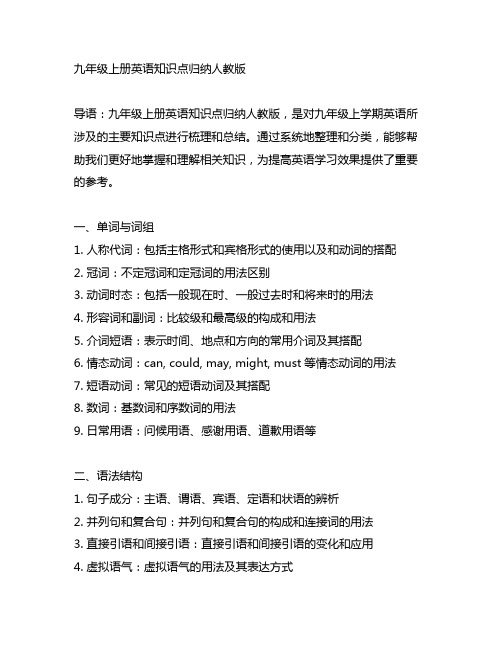
九年级上册英语知识点归纳人教版导语:九年级上册英语知识点归纳人教版,是对九年级上学期英语所涉及的主要知识点进行梳理和总结。
通过系统地整理和分类,能够帮助我们更好地掌握和理解相关知识,为提高英语学习效果提供了重要的参考。
一、单词与词组1. 人称代词:包括主格形式和宾格形式的使用以及和动词的搭配2. 冠词:不定冠词和定冠词的用法区别3. 动词时态:包括一般现在时、一般过去时和将来时的用法4. 形容词和副词:比较级和最高级的构成和用法5. 介词短语:表示时间、地点和方向的常用介词及其搭配6. 情态动词:can, could, may, might, must等情态动词的用法7. 短语动词:常见的短语动词及其搭配8. 数词:基数词和序数词的用法9. 日常用语:问候用语、感谢用语、道歉用语等二、语法结构1. 句子成分:主语、谓语、宾语、定语和状语的辨析2. 并列句和复合句:并列句和复合句的构成和连接词的用法3. 直接引语和间接引语:直接引语和间接引语的变化和应用4. 虚拟语气:虚拟语气的用法及其表达方式5. 名词性从句:宾语从句、主语从句、表语从句和同位语从句的用法6. 状语从句:时间状语从句、地点状语从句、原因状语从句、条件状语从句和结果状语从句的连接词和构成三、阅读理解1. 阅读策略:快速阅读、略读和深度阅读的技巧和方法2. 阅读题型:根据文章内容回答问题、归纳文章主旨和作者观点等题型的解题技巧3. 阅读材料:包括记叙文、议论文、说明文和应用文等不同类型的阅读材料四、写作表达1. 书面表达:书信、便条、日记、通知、邀请函等书面表达形式的写作技巧2. 口头表达:根据具体情境进行口头表达的能力训练3. 写作技巧:逻辑清晰、语言流畅、表达准确和适当使用修辞手法等写作技巧的培养结语:九年级上册英语知识点归纳人教版,从单词与词组、语法结构、阅读理解和写作表达四个方面全面总结了九年级上学期英语的主要知识点。
通过系统地学习和掌握这些知识,我们可以更好地理解和运用英语,为提高英语学习效果奠定坚实的基础。
最全面人教版九年级上册英语各单元知识点总复习归纳总结

最全面人教版九年级上册英语各单元知识点总复习归纳总结Unit 1: Hello!- Greetings and introductions: Learn how to greet people and introduce yourself.- Numbers: Practice numbers and learn how to say and write them.- Personal information: Learn how to ask and answer questions about personal information like name, age, and nationality.Unit 2: How Do You Study for a Test?- Study methods: Learn different ways to study for tests and improve learning efficiency.- Time management: Understand the importance of time management in studying.- Test preparation: Learn strategies for preparing effectively for exams.- Giving advice: Practice giving and receiving study advice using modal verbs.Unit 3: What Are You Doing for Vacation?- Vacation plans: Learn how to talk about your plans for the vacation.- Leisure activities: Discuss different leisure activities and preferences.- Present continuous tense: Understand and use the present continuous tense to talk about present actions.- Future plans: Express future plans and intentions using "be going to" and present continuous tense.Unit 4: I Used to Be Afraid of the Dark.- Past experiences: Learn how to talk about past experiences using "used to" and simple past tense.- Phobias and fears: Discuss different phobias and fears people may have.- Narrative tenses: Understand and use narrative tenses to talk about past events.Unit 5: What is the highest mountain in the world?- Geography and landmarks: Learn about different geographical features and famous landmarks.- Describing places: Practice describing different places using adjectives.- Research skills: Learn how to conduct research and gather information about different topics.Unit 6: Why don't you get her a scarf?- Giving suggestions: Practice suggesting and responding to suggestions.- Gift ideas: Discuss different gift ideas for various occasions.- Buying clothes: Learn how to describe and buy clothes in a store.- Preferences: Express personal preferences and opinions using adjectives.Unit 7: Teenagers should be allowed to choose their own clothes.- Rules and regulations: Discuss rules and regulations for teenagers.- Arguments for and against: Present arguments for and against a given topic.- Writing an opinion article: Learn how to write an opinion article expressing personal views.- Persuasive language: Use persuasive language to convince others of a certain viewpoint.Unit 8: I'll help clean up the city parks.- Volunteering: Discuss different volunteer activities and their benefits.- Environmental issues: Learn about environmental problems and ways to address them.- Expressing willingness: Use "will" and "be willing to" to express willingness to help.- Making suggestions: Practice making suggestions on how to improve the environment.Unit 9: What does he look like?- Physical appearance: Learn vocabulary to describe people's physical appearance.- Personality traits: Discuss different personality traits and their impact on people's lives.- Describing people: Practice describing people using adjectives and sentence structures.- Role plays: Act out different scenarios and describe the characters involved.以上是最全面人教版九年级上册英语各单元知识点的总复习归纳总结。
人教版初三上册英语重要考点知识点总结总结

人教版初三上册英语重要考点知识点总结总结能力是一个人的长度;勤奋是一个人的宽度;善于抓住机遇构成这个人的高度。
长度、宽度、高度的乘积,就能算出我们每个人的生命容量。
下面是为大家整理的有关初三上册英语重要考点知识点总结,希望对你们有帮助!初三上册英语重要考点知识点总结1III.交际用语1.---Excuseme,haveyougot…?---Yes,Ihave.(Sorry,Ihaven’t.)2.---Whydon’tyou…?---Thanks,Iwill.3.---Thanksalot.(Thankyouverymuch.)---Youarewelcome.4.---Haveyoueverdone…?---Yes,Ihave,once.(No,never.)5.---I’veju stdone…---Really?6.---What’s…like?7.---Howlonghaveyoubeen…?---Since…8.---Haveyoueverbeento…?---I’veneverbeenthere.(Noneofushas./Only…has.)9.---Wouldyouliketohaveatry?---Idon’tthinkIcan…10.---Whathaveyou donesince…?11.---Howlonghaveyoubeenatthis…?---For…12.---Howlonghasshe/heworkedthere…?---She’s/He’sworkedtherefor…/allher/hislife.13.---I’msorryheisn’thererightnow.14.---MayIhelpyou?15.---That’sverykindofyou.16.---Couldwegoscubadiving?17.---Couldyoutellushowlongwe’regoingtobeaway?18.---Let’strytofindsomeinformationaboutit,OK?19.---CouldyoupleasetellmehowtosearchtheInternet?20.---Gostraightalonghere.21.---PleasegotoGate12.22.---Pleasecomethisway.23.---CouldyoutellmewhatyouthinkaboutHainanIsland?24.---Thatsoundsreallycool!IV.重要语法1.宾语从句2.现在完成时3.一般过去时与现在完成时的用法比较:【名师讲解】1.Maybe/maybe(1)maybe是副词,意思是“大概,也许”,常用作状语。
初三上英语知识点归纳人教

初三上英语知识点归纳人教1. 时态与语态:a. 一般现在时:表述常规、习惯性的动作或真理;b. 现在进行时:表述当前正在进行的动作;c. 一般过去时:表述过去发生的动作或状态;d. 过去进行时:表述过去某个时间正在进行的动作;e. 一般将来时:表述将来发生的动作或打算;f. 一般过去将来时:表述过去某个时间本该发生但没有发生的动作;g. 被动语态:强调动作的承受者,一般由助动词be+及物动词的过去分词构成。
2. 冠词:a. 定冠词the:特指某个人或物;b. 不定冠词a/an:泛指一个人或物;c. 零冠词:用于表示泛指或不可数名词。
3. 名词:a. 可数名词:具体的人或物,可分为单数和复数形式;b. 不可数名词:无法分为单数和复数形式的名词。
4. 代词:a. 主格代词:作主语,如I、you、he、she等;b. 宾格代词:作宾语,如me、you、him、her等;c. 形容词性物主代词:用来修饰名词的代词,如my、your、his、her等;d. 名词性物主代词:代替名词的代词,如mine、yours、hers等;e. 反身代词:表示动作的承受者与发出者是同一个人或物,如myself、yourself等。
5. 动词:a. 不及物动词:无需宾语就可以表达完整意义的动词;b. 及物动词:需要宾语才能表达完整意义的动词;c. 动词的三种形式:基本形式、过去式和过去分词;d. 动词的时态与语态:见第1点。
6. 形容词:a. 形容词的基本用法:用来描述名词的特征或性质;b. 比较级与最高级:用来比较两个或多个人或物的特征或性质。
7. 副词:a. 副词的基本用法:用来修饰动词、形容词、副词或整个句子;b. 比较级与最高级:用来比较两个或多个动作、性质或程度。
8. 介词:a. 表示时间的介词:如in、on、at等;b. 表示地点的介词:如in、on、at、to等;c. 表示方式的介词:如by、with等。
9. 连词:a. 并列连词:用来连接并列的词、短语或句子,如and、but等;b. 引导状语从句的连词:如when、while、before、after等;c. 引导目的从句的连词:如so that、in order that等;d. 引导结果从句的连词:如so...that、such...that等。
人教版九年级英语全册知识点归纳

人教版九年级英语全册知识点归纳Document serial number【KK89K-LLS98YT-SS8CB-SSUT-SST108】PEP九年级英语全册知识点归纳Unit 1 How can we become good learners?重点:1. 学习并掌握用how来询问做某事的方式;2. 学习并掌握by+ving来表达做某事的方法。
难点:动名词在句中充当的成分。
知识点:ask for help 寻求帮助 work with sb. 和……一起工作have conversation with 和……一起对话main idea 中心思想the secret to ……的秘诀 word by word 逐字take time 花时间 word group 词组 body language 肢体语言expressions on faces 脸上的表情 key words 关键词as well 也 look up 查看 take notes 记笔记practice doing sth. 练习做某事pen pal 笔友 keep a diary 记日记make mistakes 犯错 increase 增加;提高 decrease 减少;降低practice with sb. 和……一起练习 depend on 依赖whether or not 是否 pay attention to sth. / doing sth. 注意某事/做某事for a long time 很长一段时间 connect … with …把……和……连接起来write down 写下 mind map 思维导图lifelong journey 终身的旅程 on one’s own 独自地bit by bit 一点点 at once 马上,立刻It’s a piece of cake. 小菜一碟。
It serves you right. 你活该。
最新人教版九年级英语上册单元知识归纳全册

最新人教版九年级英语上册单元知识归纳全册Unit 1 How can we become good learners?单元知识点归纳Section A(1a-2d)必背单词1.improve v. 提高,改善→improve sth. 提高某方面2.conversation n.交谈;谈话→have conversations with sb. 与某人交谈/谈话3.aloud adv.大声地;出声地→read aloud大声读;loudly→ talk loudly大声说话4.pronunciation n.发音;读音→ get the pronunciation right使得发音正确;pronounce v.发音→ pronounce the word发这个单词的音5.patient adj. 有耐心的n.病人→be patient with sb.对某人有耐心6.textbook n.教科书;课本7.sentence n. 句子必背短语8.by asking the teacher for help通过向老师寻求帮助9.by working with a group 通过小组合作10.study for a test 为考试而学习11.word by word 逐字必背句子12. I've learned a lot that way. 我用那种方法学到很多。
13. It really improves my speaking skills.它确实提高了我的口语能力。
14. It's too hard to understand spoken English.听懂英语口语很难。
15.It takes time.这需要时间。
16. The more you read,the faster you'll be.你读得越多,你将会越快。
Section A(3a-4c)必背单词1. expression n.表情;表示;表达方式→ express v.表达;表露2.discover v. 发现;发觉→discovery n.发现3.repeat v. 重复;重做4.secret n.秘密;秘诀adj.秘密的;保密的5.note n.笔记;记录→ take notes 记笔记v.注意;指出6.physics n.物理;物理学7.chemistry n. 化学8.grammar n. 语法必背短语9.be afraid to害怕10. fall in love with 爱上……11.look up (在词典或参考书中)查阅;抬头看→look it up12. because of因为必背句子13.The teacher spoke so quickly that I did not understand her most of the time.老师说得太快,以至于很多时候我都听不懂。
人教版九年级上册英语知识点归纳总结
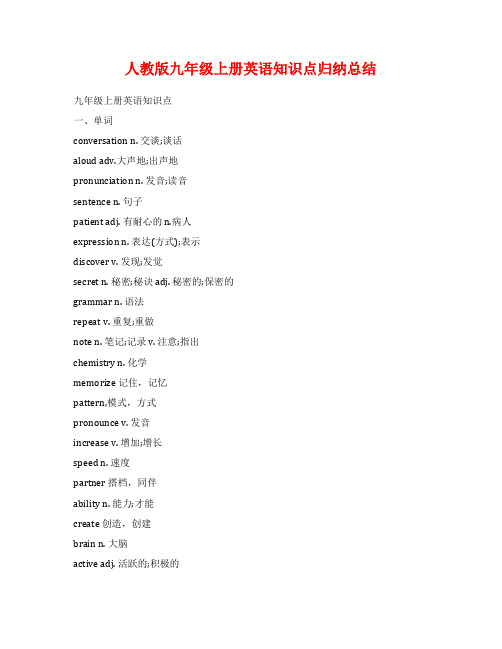
人教版九年级上册英语知识点归纳总结九年级上册英语知识点一、单词conversation n. 交谈;谈话aloud adv.大声地;出声地pronunciation n. 发音;读音sentence n. 句子patient adj. 有耐心的 n.病人expression n. 表达(方式);表示discover v. 发现;发觉secret n. 秘密;秘诀 adj. 秘密的;保密的grammar n. 语法repeat v. 重复;重做note n. 笔记;记录 v. 注意;指出chemistry n. 化学memorize 记住,记忆pattern,模式,方式pronounce v. 发音increase v. 增加;增长speed n. 速度partner 搭档,同伴ability n. 能力;才能create 创造,创建brain n. 大脑active adj. 活跃的;积极的attention n. 注意;关注review v. & n. 回顾;复习knowledge n. 知识;学问wisely adv. 明智地;聪明地二、短语Ask sb for help向人寻求帮助Finish doing sth.完成做事Because of … 因为…Try to do sth.尽力做事At first 首先Be afraid to do sth.害怕做事Fall in love with 爱上人Make mistakes 犯错误Depend on 依赖于,取决于Be interest in 对…感兴趣Take notes 做笔记Keep a diary 写日记look up 查阅,抬头看be born with 天生具有pay attention to 注意;关注三、句型1、How do you learn English?I learn by doing sth.2、How can I improve …?One way is by doing sth.3、Do you learn English by doing sth.?Yes, I do.4、What about doing sth.?5、the +adj.比较级…the + adj.比较级6、I don`t know how to dosth.7、It is +adj.+for sb.+todo sth.8、I want to do sth. sothat +目的'状语从句9、Even if +让步状语从句,+主句。
人教版九年级英语上册各单元知识点归纳
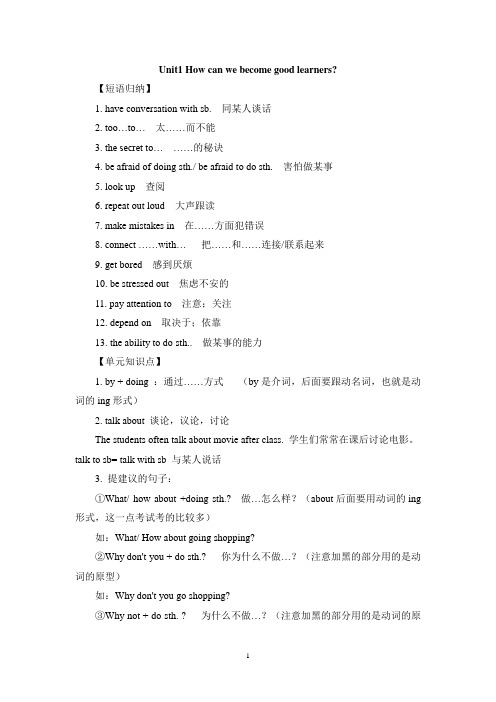
Unit1 How can we become good learners?【短语归纳】1. have conversation with sb. 同某人谈话2. too…to… 太……而不能3. the secret to… ……的秘诀4. be afraid of doing sth./ be afraid to do sth. 害怕做某事5. look up 查阅6. repeat out loud 大声跟读7. make mistakes in 在……方面犯错误8. connect ……with… 把……和……连接/联系起来9. get bored 感到厌烦10. be stressed out 焦虑不安的11. pay attention to 注意;关注12. depend on 取决于;依靠13. the ability to do sth.. 做某事的能力【单元知识点】1. by + doing :通过……方式(by是介词,后面要跟动名词,也就是动词的ing形式)2. talk about 谈论,议论,讨论The students often talk about movie after class. 学生们常常在课后讨论电影。
talk to sb= talk with sb 与某人说话3. 提建议的句子:①What/ how about +doing sth.? 做…怎么样?(about后面要用动词的ing 形式,这一点考试考的比较多)如:What/ How about going shopping?②Why don't you + do sth.? 你为什么不做…?(注意加黑的部分用的是动词的原型)如:Why don't you go shopping?③Why not + do sth. ? 为什么不做…?(注意加黑的部分用的是动词的原型)如:Why not go shopping?④Let's + do sth. 让我们做…吧。
人教英语九年级上册知识点
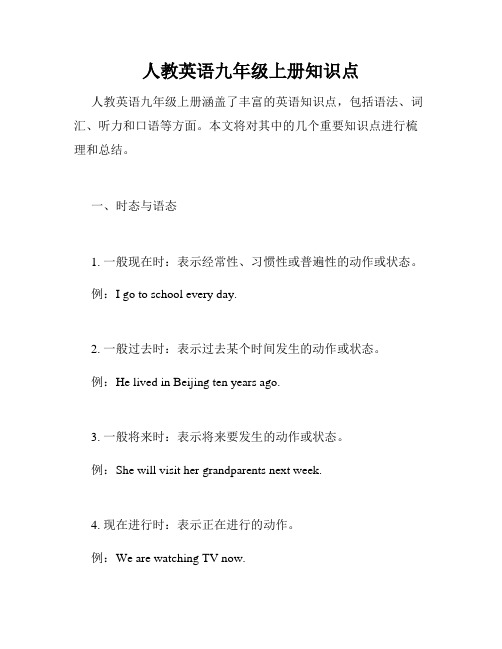
人教英语九年级上册知识点人教英语九年级上册涵盖了丰富的英语知识点,包括语法、词汇、听力和口语等方面。
本文将对其中的几个重要知识点进行梳理和总结。
一、时态与语态1. 一般现在时:表示经常性、习惯性或普遍性的动作或状态。
例:I go to school every day.2. 一般过去时:表示过去某个时间发生的动作或状态。
例:He lived in Beijing ten years ago.3. 一般将来时:表示将来要发生的动作或状态。
例:She will visit her grandparents next week.4. 现在进行时:表示正在进行的动作。
例:We are watching TV now.5. 现在完成时:表示过去发生的动作对现在造成的影响。
例:I have finished my homework.6. 被动语态:通过使用助动词be的不同形式来表示动作的承受者或者发出者。
例:The book was written by the famous writer.二、疑问句和否定句1. 疑问句:将助动词do/does/did提前于主语,动词用原形。
例:Do you like basketball?2. 否定句:在动词前面加上don't/doesn't/didn't。
例:She doesn't like coffee.三、连词与从句1. and:连接并列句。
例:I like apples and bananas.2. but:连接转折句。
例:He is tired, but he still keeps running.3. because:连接原因从句。
例:I didn't go to the party because I was busy.4. if:连接条件从句。
例:If it rains, we will stay at home.四、情态动词1. can:表示能力或许可。
(完整版)人教版九年级全一册英语知识点归纳.docx

PEP 九年英知点Unit 1 How can we become good learners?重点: 1.学并掌握用how 来做某事的方式; 2.学并掌握by+ving 来表达做某事的方法。
点:名在句中充当的成分。
知点:ask for help 求帮助work with sb. 和⋯⋯一起工作have conversation with 和⋯⋯一起main idea 中心思想the secret to ⋯⋯的秘word by word 逐字take time 花word groupbody language 肢体言expressions on faces上的表情key words 关as well 也look up 看take notes 笔practice doing sth. 做某事pen pal 笔友keep a diary 日make mistakes 犯increase 增加;提高decrease 减少;降低practice with sb. 和⋯⋯一起depend on 依whether or not 是否pay attention to sth. / doing sth. 注意某事 /做某事for a long time 很一段connect ⋯ with ⋯把⋯⋯和⋯⋯接起来write down 写下mind map 思lifelong journey 身的旅程on one ’ s own独自地bit by bit 一点点at once 上,立刻It ’ s a piece of cake小.菜一碟。
It serves you right. 你活。
Use it or lose it.Practice makes perfect.Unit 2 I think that mooncakes are delicious!重点 & 点: 1. that, if whether 引的从句; 2. 感句的学和运用。
九年级上册人教版教材英语

九年级上册人教版教材英语一、词汇。
1. 重点单词。
- textbook:课本。
例如:Our English textbook is very interesting.(我们的英语课本非常有趣。
)- conversation:对话。
常用于描述人们之间的口头交流。
如:I had a long conversation with my teacher about my study.(我和我的老师就我的学习进行了一次长谈。
)- aloud:大声地。
通常用来修饰动词read,say等。
例如:Read the passage aloud.(大声朗读这篇文章。
)- pronunciation:发音。
例如:His pronunciation is very good.(他的发音非常好。
)- sentence:句子。
We should learn how to make correct sentences.(我们应该学习如何造出正确的句子。
)2. 词汇记忆方法。
- 词根词缀法。
- 例如,“un - ”这个前缀表示否定。
像“unhappy”(不开心的),“unusual”(不寻常的)。
- 联想记忆法。
- 对于“pest”(害虫)这个单词,可以联想成“拍死它”,这样就容易记住它的含义。
- 语境记忆法。
- 把单词放在句子或者短文语境中记忆。
如学习“patient”(有耐心的;病人)这个单词时,可以记住句子“He is a patient teacher. He has a lot of patients.”(他是一位有耐心的老师。
他有很多病人。
)二、语法。
1. 一般现在时的用法。
- 表示经常或习惯性的动作或状态。
例如:I get up at six every day.(我每天六点起床。
)- 表示客观事实或普遍真理。
例如:The earth goes around the sun.(地球绕着太阳转。
)- 结构:- 主语为第三人称单数(he/she/it等)时,动词要用第三人称单数形式(一般是在动词原形后加 - s或 - es)。
人教版九年级英语上册知识点归纳
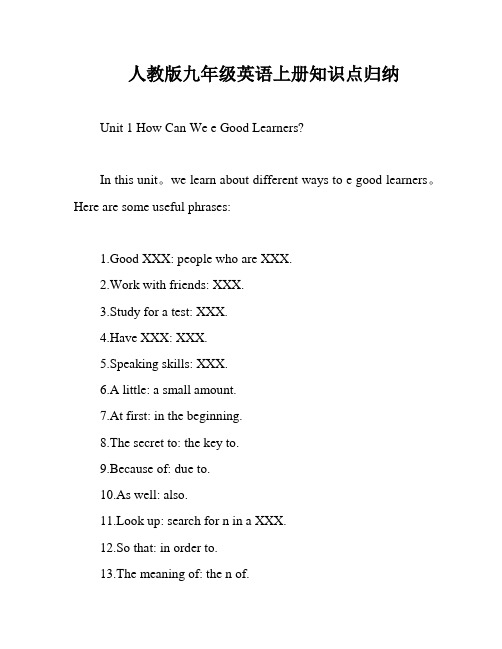
人教版九年级英语上册知识点归纳Unit 1 How Can We e Good Learners?In this unit。
we learn about different ways to e good learners。
Here are some useful phrases:1.Good XXX: people who are XXX.2.Work with friends: XXX.3.Study for a test: XXX.4.Have XXX: XXX.5.Speaking skills: XXX.6.A little: a small amount.7.At first: in the beginning.8.The secret to: the key to.9.Because of: due to.10.As well: also.11.Look up: search for n in a XXX.12.So that: in order to.13.The meaning of: the n of.14.Make mistakes: do something wrong.15.Talk to: XXX.16.Depend on: rely on.17.In common: shared.18.Pay n to: focus on.19.Connect。
with。
: link or XXX。
20.For example: as an XXX.21.Think about: consider.22.Even if: despite.23.Look for: search for.24.XXX: XXX.25.Make word cards: XXX.26.Ask the teacher for help: request assistance from XXX.27.Read aloud: XXX.28.XXX: XXX.29.Give a report: present n to an audience.30.Word by word: one word at a time.31.So。
人教版初三英语上册知识点总结
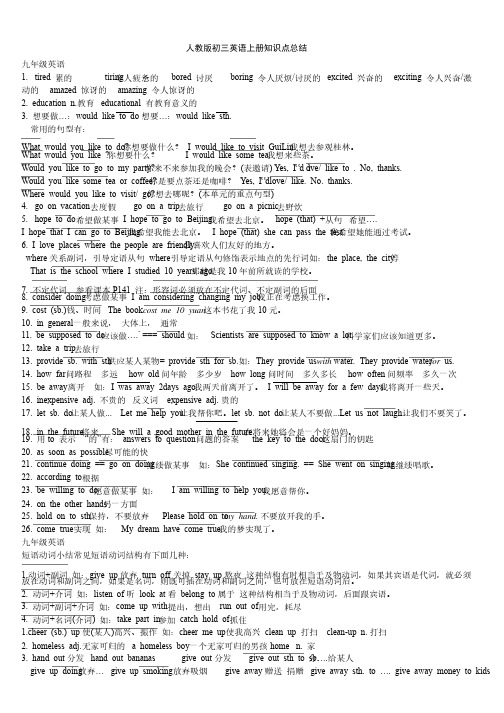
人教版初三英语上册知识点总结九年级英语1. tired 累的 tiring 令人疲惫的bored 讨厌boring 令人厌烦/讨厌的excited 兴奋的exciting 令人兴奋/激动的amazed 惊讶的amazing 令人惊讶的2. education n. 教育教育educational 有教育意义的3. 想要做…:would like to do 想要…:would like sth. 常用的句型有:What would you like to do? 我想去参观桂林。
你想要做什么?I would like to visit GuiLin. What would you like ? 你想要什么?I would like some tea. 我想来些茶。
Would you like to go to my party? 你来不来参加我的晚会?(表邀请) Yes, I‟d l ove/ like to . No, thanks. love/ like. No. thanks. Would you like some tea or coffee? 你是要点茶还是咖啡?Yes, I‟d l ove/ like. No. thanks. Where would you like to visit/ go? 你想去哪呢?(本单元的重点句型) 4. go on vacation 去度假去度假go on a trip 去旅行go on a picnic 去野炊5. hope to do 希望做某事从句希望…. 我希望去北京。
hope (that) + 从句希望做某事I hope to go to Beijing. I hope that I can go to Beijing.我希望她能通过考试。
我希望我能去北京。
I hope (that) she can pass the test.6. I love places where the people are friendly. 我喜欢人们友好的地方。
- 1、下载文档前请自行甄别文档内容的完整性,平台不提供额外的编辑、内容补充、找答案等附加服务。
- 2、"仅部分预览"的文档,不可在线预览部分如存在完整性等问题,可反馈申请退款(可完整预览的文档不适用该条件!)。
- 3、如文档侵犯您的权益,请联系客服反馈,我们会尽快为您处理(人工客服工作时间:9:00-18:30)。
人教版九年级英语全册知识点归纳及习题(最新)Unit 1 How can we become good learners短语总结:1. good learners 优秀的学习者2. work with friends 和朋友一起学习3. study for a test 备考 conversations with 与……交谈skills 口语技巧 little 有点儿first 起初起先secret to......, .......的秘诀of 因为 well 也up (在词典中等)查阅;抬头看 that 以便,为了meaning of ……的意思 mistakes 犯错误to 交谈 on 依靠依赖common 共有的 attention to 注意关注……with……把……联系。
example 例如about 考虑 if 即使尽管纵容for 寻找 about 担心担忧word cards 制作单词卡片 the teacher for help 向老师求助aloud 大声读 english 英语口语a report 作报告 by word 一字一字地……that 如此……以至于 in love with 爱上interesting 有趣的事情 notes 记笔记often 多久一次 lot of 许多ability to do sth. 做某事的能力 habits 学习习惯interested in 对……感兴趣 bored 感到无聊good at 在……方面擅长 afraid of 害怕other 彼此互相 of 代替而不是二.用法集萃1. by doing sth 通过做某事 +be+adj+to do sth 做某事是……的doing sth 完成某事 about doing sth做某事怎么样to do sth 尽力做某事 +比较近,the+比较近越……,就越……it+adj+to do sth 发现做某事 afraid of doing sth 害怕做某事sb (to) do sth 帮助某人做某事 doing sth 练习做某事doing sth 一直做某事 afraid to do sth 害怕做某事to do sth 开始做某事 to do sth 想要做某事to do sth 需要做某事 to do sth 记得做某事射(射着,射死等表结果) at(瞄准)射Unit1 检测题一.单项选择1.—_______ do you study English —By listening to tapes.A. HowB. WhereC. WhenD. Whycan improve your English practicing more.3. Why not practice your _________English in _________ English-speaking countryA. speaking, aB. speaking, anC. spoken, an4. ________conversations with others is one of the secrets to_________a successful learner.A. Practice, becomeB. Practice, becomingC. Practicing, becoming5 ---The re’re a few new words in the article ---What about_________in your dictionaryA. looking it upB. looking up itC. looking them up6. We’ll go out to play _________ it rains tomorrow. A. soB. unlessC. because7. Can you ________which is the right answer to the questionA. look forB. findC. find out8. Jenny used to be afraid to ________in class, so she always ________nothing.A. speak, talkedB. speak, saidC. say, spoke9.—Why not listen to BBC news to improve your listening skills —It’s ________ difficult _______ I can’t follow. A. too; to B. so; that C. such; that10. A good learner often thinks about ________he needs to practice more.A. thatB. whatC. how’m going to listen _______the tape. --OK. Remember to listen ________the key words.A. to, toB. to ,forC. for, to12. ________or not you can learn well depends on your learning habits.A. IfB. WeatherC. Whether13. I have finished _________my report. May I start to learn ________the guitarA. writing, playingB. writing, to playC. to write, playing14. ---I often make mistakes _______grammar. ---Why not ask your teacher _______helpA. in, toB. in, forC. at, to15. _________write down the new words in your notebookA. Would you likeB. How aboutC. Could you please16. ---Jack used to have ________writing practice. ---Yes, and he had learned _________.A. a lot of, a lot ofB. a lot of, a lotC. a lot, a lot of17. The more c areful you are, ________mistakes you’ll . fewerB. the fewerC. the less18. Good learners aren’t afraid _______mistakes. Instead, they learn ________mistakes.A. of making, inB. to make, fromC. to make, in19. For the first time, pay attention _________quickly to getthe main ideas.A. to readB. readingC. to readingdiscovered that listening to is the secret language learning.intresting, to something, tointerested, of something offound it very easy English well. learn22. He_____ with the girl with golden hair and will soon get married____ her.A. falls in love; toB. is in love; toC. loves; withD. loves; to23. My father thinks _____ is a great way to learn English.A. study grammar.B. I study grammar.C. studying grammar.D. studies grammar24 Why not ___ your teacher for help when you can’t finish _____it by yourselfA. ask; writeB. to ask; writingC. ask; writingD. asking; write25. I wonder if I can learn English well.—. All things are difficult before they are easy.A. I am afraid soB. You’re slowC. It takes timeD. It’s a piece of cake26 You’ll find _____________ easy to learn it well. A. thatB. itsC. itD. this27. –I don’t have a p artner to practice English______________.---Why not join an English language club to practice_______________A. /; speakingB. with; to speakC. /; to speakD. with; speaking28. ---She hardly makes mistakes _________English grammar.---No, it seems that she was born ________the ability to learnlanguages.A. in, withB. with, inC. in, inD. with, with 二用所给单词的适当形式填空。
about ________(go) outside for a walklearns English by ______(keep) an English notebook.you have fun_______(lea rn) English’t be afraid of ______ (make) mistakes.was born with the ability_________(learn).night I met a beautiful girl__________ (call) Li Yan’s not easy for me _______(follow) the teachers because they speak too quickly.8 Do you enjoy ______(learn) Englishhave to finish (read) a book and give a report next Monday.often practice (speak) English after class.night they kept (write) new words.you have trouble _______(take) a lot of grammar notesdon’t know how _______(use) . It’s important for us _______(learn) English well.classroom needs _______(clean) every . Why__________ (not come) here on footFen found it difficult _______________(learn) English.’s too hard ________________(understand) the voices. (memorize) words and phrases is a good way to study English.20. How can you become a_________(success) learner________(hard) you study, the ________(good) grades you will get.you tell me the secret ___________(learn) English wellis always afraid ___________(ask) teachers’ questions in class.haven’t decided whether ____(leave) or more you eat,the (fat) you will beneed_________(practice) their pronunciation.not enough_ (work) hard at ..I think the movie is interesting_____(watch)29..The sto ry is very _____ . I don’t like it (bore)should pay more attention to (prounouce) every word correctly.三.用所给单词或短语的适当形式填空。
